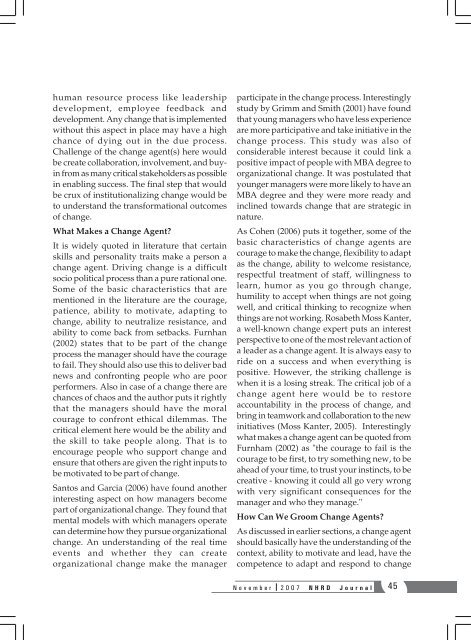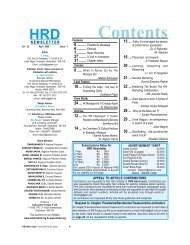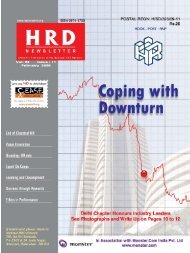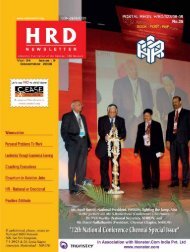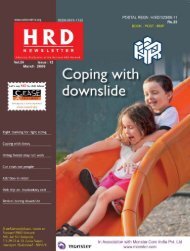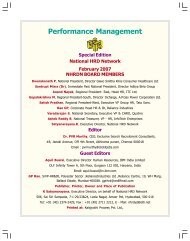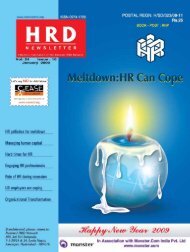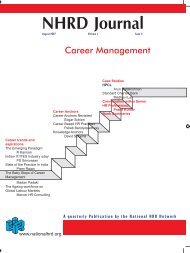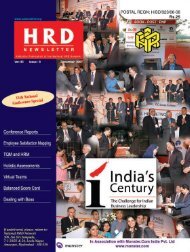NHRD Journal - National HRD Network
NHRD Journal - National HRD Network
NHRD Journal - National HRD Network
Create successful ePaper yourself
Turn your PDF publications into a flip-book with our unique Google optimized e-Paper software.
human resource process like leadership<br />
development, employee feedback and<br />
development. Any change that is implemented<br />
without this aspect in place may have a high<br />
chance of dying out in the due process.<br />
Challenge of the change agent(s) here would<br />
be create collaboration, involvement, and buyin<br />
from as many critical stakeholders as possible<br />
in enabling success. The final step that would<br />
be crux of institutionalizing change would be<br />
to understand the transformational outcomes<br />
of change.<br />
What Makes a Change Agent?<br />
It is widely quoted in literature that certain<br />
skills and personality traits make a person a<br />
change agent. Driving change is a difficult<br />
socio political process than a pure rational one.<br />
Some of the basic characteristics that are<br />
mentioned in the literature are the courage,<br />
patience, ability to motivate, adapting to<br />
change, ability to neutralize resistance, and<br />
ability to come back from setbacks. Furnhan<br />
(2002) states that to be part of the change<br />
process the manager should have the courage<br />
to fail. They should also use this to deliver bad<br />
news and confronting people who are poor<br />
performers. Also in case of a change there are<br />
chances of chaos and the author puts it rightly<br />
that the managers should have the moral<br />
courage to confront ethical dilemmas. The<br />
critical element here would be the ability and<br />
the skill to take people along. That is to<br />
encourage people who support change and<br />
ensure that others are given the right inputs to<br />
be motivated to be part of change.<br />
Santos and Garcia (2006) have found another<br />
interesting aspect on how managers become<br />
part of organizational change. They found that<br />
mental models with which managers operate<br />
can determine how they pursue organizational<br />
change. An understanding of the real time<br />
events and whether they can create<br />
organizational change make the manager<br />
participate in the change process. Interestingly<br />
study by Grimm and Smith (2001) have found<br />
that young managers who have less experience<br />
are more participative and take initiative in the<br />
change process. This study was also of<br />
considerable interest because it could link a<br />
positive impact of people with MBA degree to<br />
organizational change. It was postulated that<br />
younger managers were more likely to have an<br />
MBA degree and they were more ready and<br />
inclined towards change that are strategic in<br />
nature.<br />
As Cohen (2006) puts it together, some of the<br />
basic characteristics of change agents are<br />
courage to make the change, flexibility to adapt<br />
as the change, ability to welcome resistance,<br />
respectful treatment of staff, willingness to<br />
learn, humor as you go through change,<br />
humility to accept when things are not going<br />
well, and critical thinking to recognize when<br />
things are not working. Rosabeth Moss Kanter,<br />
a well-known change expert puts an interest<br />
perspective to one of the most relevant action of<br />
a leader as a change agent. It is always easy to<br />
ride on a success and when everything is<br />
positive. However, the striking challenge is<br />
when it is a losing streak. The critical job of a<br />
change agent here would be to restore<br />
accountability in the process of change, and<br />
bring in teamwork and collaboration to the new<br />
initiatives (Moss Kanter, 2005). Interestingly<br />
what makes a change agent can be quoted from<br />
Furnham (2002) as "the courage to fail is the<br />
courage to be first, to try something new, to be<br />
ahead of your time, to trust your instincts, to be<br />
creative - knowing it could all go very wrong<br />
with very significant consequences for the<br />
manager and who they manage."<br />
How Can We Groom Change Agents?<br />
As discussed in earlier sections, a change agent<br />
should basically have the understanding of the<br />
context, ability to motivate and lead, have the<br />
competence to adapt and respond to change<br />
November 2007 <strong>N<strong>HRD</strong></strong> <strong>Journal</strong> 45


